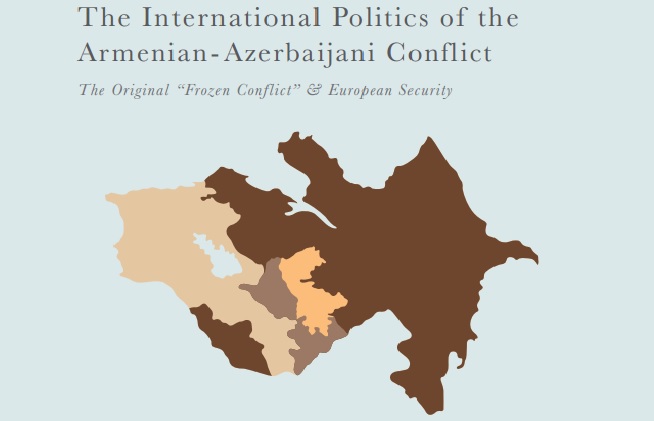The International Politics of the Armenian-Azerbaijani Conflict

Russia: an Enabler of Jihad?
Op-Ed, Wilfried Martens Centre for European Studies, January 16, 2017
Svante E. Cornell, Russia: an Enabler of Jihad?
Russian officials have had to contain their glee in monitoring recent political events in America and Europe. They appear to think their days in the cold may soon be over. Much has been made of President-elect Donald Trump’s wish to improve relations with Moscow, but the last news out of France appears even more auspicious to Moscow.
The far-right candidate, Marine Le Pen, is known for her pro-Putin sympathies. Now, with François Fillon’s nomination as the center-right candidate, both major contenders in next year’s French presidential election are favorably disposed toward Russia.
These warmer feelings towards Russia are based, mainly, on changing threat perceptions in the West. Since the emergence of the Islamic State and the proliferation of terrorist attacks in Europe and America, many Europeans and Americans appear to view Moscow’s aggression against its neighbors, such as Ukraine and Georgia, as an increasingly esoteric problem.
Particularly after Russia’s intervention in Syria, even on the right many now view Russia not as a threat to the West but as a natural ally in defeating the jihadi threat.
While this notion is gaining popularity, it is at best the triumph of hope over experience, and at worst a dangerous delusion. Russia’s interaction with radical Islam over two decades shows that it is part of the problem, not the solution. In fact, leaders in Moscow have a track record of manipulating radical Islam whenever that has suited their purposes – including systematic collusion with Islamic extremists. A few examples illustrate this policy. Read more
Svante E. Cornell is Director of the Central Asia-Caucasus Institute & Silk Road Studies Program, a Joint Center affiliated with the Johns Hopkins University’s School of Advanced International Studies and the Stockholm-based Institute for Security and Development Policy.
Azerbaijan’s Formula: Secular Governance and Civic Nationhood
IMF Economic Outlook on Caucasus and Central Asia: Structural Transformation Needed

CACI FORUM
IMF Economic Outlook on Caucasus and Central Asia: Structural Transformation Needed
Wednesday, 30 November 2016, from 5 to 7 p.m.
Light reception with Georgian wines at 5; main program at 5:30
A decline in commodity prices and slowing in key economic partners such as Russia and China, had a significant impact on the countries of Central Asia and the South Caucasus. Regional growth is projected to average only 1.3 percent this year, representing a dramatic decrease in economic activity compared with growth rates of the early 2000s. According to the IMF, next year the region's economies should turn a corner, with average growth reaching 2.6 percent. Medium-term prospects remain weak, however, with growth projected to average 4 percent in the 2018–21 period, half that in 2000–14.
These and other important economic topics will be discussed as part of the Regional Economic Outlook Report, the latest IMF release on the Caucasus and Central Asia. The special focus of this year's presentation is Kazakhstan: the discussion will review this country's macroeconomic and structural policy response to shocks that began in late 2014, and will examine prospects for the medium term.
Speakers:
Juha Kahkonen, Deputy Director, Middle East and Central Asia Dept., IMF
Mark Horton, Mission Chief, Kazakhstan, IMF
Moderator:
Mamuka Tsereteli, Research Director, Central Asia-Caucasus Institute
Rome Building Auditorium
SAIS - Johns Hopkins University
1619 Massachusetts Ave., NW
Washington, DC 20036
The fallacy of ‘compartmentalisation’: the West and Russia from Ukraine to Syria
European View, June 2016, Volume 15, Issue 1, pp 97–109
Svante E. Cornell, The fallacy of ‘compartmentalisation’: the West and Russia from Ukraine to Syria
In the post-Soviet space as well as the Middle East, Western leaders have largely failed to heed ample evidence that the goals of the Russian leadership are fundamentally opposed to those of the EU and the US. Whereas Moscow seeks to counter Western influence and roll back the US’s role in the world, the West has proposed a win–win approach, seeking to convince Moscow that its ‘true’ interests should lead it to cooperate with the West. When this has not worked, Western leaders have ‘compartmentalised’, isolating areas of agreement from areas of disagreement. This approach has come to the end of the road because the assumptions that undergird it are false. So long as Western powers fail to understand the fundamental incompatibility of their interests with the deeply anti-Western interests of the current power brokers in the Kremlin, they are unlikely to develop policies that achieve success.
Svante E. Cornell is Director of the Central Asia-Caucasus Institute & Silk Road Studies Program, a Joint Center affiliated with the Johns Hopkins University’s School of Advanced International Studies and the Stockholm-based Institute for Security and Development Policy.





